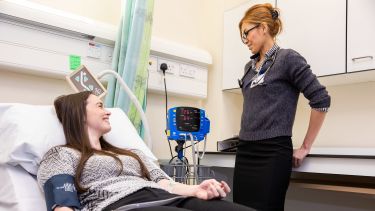Physician Associate Studies MMedSci
School of Medicine and Population Health,
Faculty of Health
-
Start date
September 2026 -
Duration
2 years -
Attendance
Full-time
Explore this course:

Course description
Physician Associates (PAs) are health professionals who address patients’ health needs while working under the supervision of doctors. Qualified PAs have direct contact with patients by taking histories, performing examinations, making diagnoses and considering management plans as part of the wider clinical team.
This course is designed to give you the skills, knowledge and experience to qualify as a PA through completion of the Physician Associate National Examination. It is aimed at graduates who are passionate about working in a frontline clinical environment as part of a multi-disciplinary team.
Your training will give you a solid foundation in generalist medical care so that you can deliver ‘first contact’ health care in multiple health settings including general practice and secondary care trusts.
The course has an integrated, systems-based approach that places the patient at the centre. The first stage is mainly based on the University of Sheffield campus. In the second stage, you will apply your knowledge and skills to placements in our partner hospitals and GP surgeries.
The University of Sheffield works closely with local acute trusts (hospitals, mental health) and primary care providers (General Practice) so that our graduates are equipped to meet the needs of potential employers and the public as a whole. Our course team has a majority of practising Physician Associates as leads and tutors and has an excellent rate of students passing the Physician Associate National Examination.
Professional bodies
Open days
Interested in postgraduate taught study? Register your interest in studying at Sheffield or attend an online event throughout the year to find out what makes studying at here special.
Duration
2 years full-time
Teaching
Our teaching is designed around the 2023 Physician Associate National Curriculum. We will also go into more detail in key areas to support your development as an all-around clinician. You will learn through lectures, small group teaching and practical sessions.
You will have contact with patients throughout the course both through our Patients as Educators programme, where you will hear first-hand from patients about their experience, and on placements in GP practices and local hospitals. Clinical skills will be developed in simulation and then in practice, to support both your academic and practical skills progression.
Assessment
You will be assessed through written assessments, multiple-choice tests, clinical examinations and workplace-based assessments
To practise in the UK, Physician Associates are required to pass the Physician Associate Registration Assessment (PARA) This exam is not included as part of this programme and you will be required to cover the costs of taking it. However, the final exam on the MMedSci will mirror the Physician Associate Registration Assessment, so that you are well prepared to take it.
Your career
After successfully completing your course and passing the Physician Associate National Examination, you will be able to apply for a variety of Physician Associate roles. Our graduates have gone on to work in GP surgeries, acute hospital trust departments such as A&E and respiratory medicine, as well as mental health trusts.
In addition, recent graduates have used their degree to pursue alternate roles outside of the NHS. There is more information about the role and becoming a Physician Associate on NHS Health Careers and National Careers Service Service websites. The GMC has also published a guide to the professional standards for physician associates and anaesthesia associates.
Student profiles
Entry requirements
Minimum 2:1 undergraduate honours degree in a relevant subject.
Minimum grade of BBB at A Level.
Subject requirement
We accept degrees in any subject including a substantial element of human or animal biology.
English language requirements
IELTS 7.5 (with 7 in each component) or University equivalent.
Other requirements
If you have any questions about entry requirements, please contact the school.
Fees and funding
Alumni discount
Save up to £2,500 on your course fees
Are you a Sheffield graduate? You could save up to £2,500 on your postgraduate taught course fees, subject to eligibility.
Apply
You can apply now using our Postgraduate Online Application Form. It's a quick and easy process.
Contact
Any supervisors and research areas listed are indicative and may change before the start of the course.
Recognition of professional qualifications: from 1 January 2021, in order to have any UK professional qualifications recognised for work in an EU country across a number of regulated and other professions you need to apply to the host country for recognition. Read information from the UK government and the EU Regulated Professions Database.


